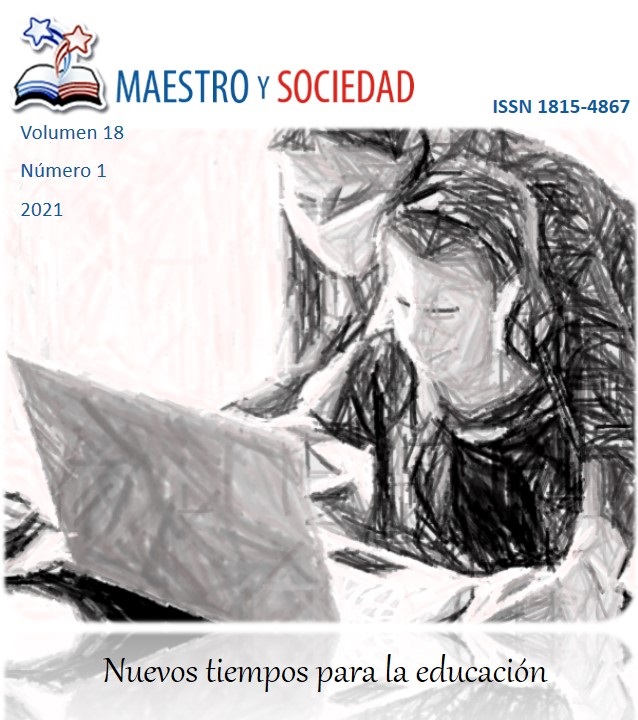Array Array
Array
Palavras-chave:
Array, ArrayResumo
ArrayReferências
2. Avendaño, V. y Flores, M. (2016). Modelos teóricos de gestión del conocimiento: descriptores, conceptualizaciones y enfoques. Entreciencias, Vol. 4(10), 201-227. Recuperad
3. Benjamín, R.I. y Blunt, J. (1992). Critical IT (Information Technology). Issues: the next ten years. Sloan Management Review. 33 (4), 7-19.
4. Cabero, J. (1998) Impacto de las nuevas tecnologías de la información y la comunicación en las organizaciones educativas. En Lorenzo, M. y otros (coords): Enfoques en la organización y dirección de instituciones educativas formales y no formales (pp. 197-206). Granada: Grupo Editorial Universitario.
5. Cabero, J. (2007). Las necesidades de las TIC en el ámbito educativo: oportunidades, riesgos y oportunidades. Tecnologías y educación educativas, 21(45). Recuperado de http://investigacion.ilce.edu.mx/tyce/45/ articulo1.pdf
6. Cabero, J. (2015). Impacto de las nuevas tecnologías de la información y comunicación en las organizaciones educativas. Recuperado de http://tecnologiaedu.us.es/ cuestionario/bibliovir/75.pdf.
7. Castells, M. (1997). La Sociedad Red. Madrid: Alianza.
8. Castells, M. (2002). La dimensión cultural de Internet, Universitat Oberta de Catalunya. Recuperado de https://www.uoc.edu/culturaxxi/esp/articles/castells0502/castells0502.html
9. Haag, S., Cummings, M & Mccubbrey D. J. (2004). Management information systems for the information age (4ª ed.). New York: McGraw-Hill.
10. Hernández, R.M. (2017). Impacto de las TIC en la educación: Retos y Perspectivas. Propósitos y Representaciones, 5(1), 325 – 347. doi:10.20511/pyr.2017.1149
11. Krüger, K. (2006). El concepto de sociedad del conocimiento. Revista Bibliográfica de Geografía y Ciencias Sociales, 11(683). Recuperado de http://www.ub.edu/geocrit/b3w-683.htm
12. Majó, J. y Marqués, P. (2002). La revolución educativa en la era internet. Colección compromiso con la educación. Barcelona: Cisspraxis.
13. Prieto, V. (2011). Impacto de las tecnologías de la información y las comunicaciones en la educación y nuevos paradigmas del enfoque educativo. Educ Med Super, 25(1), 95-102. Recuperado de http://scielo.sld.cu/scielo.php?script=sci_arttext&pid=S0864-21412011000100009&lng=es&nrm=iso
14. Ruiz, A. y Vidal, J. (marzo, 2018). Las TIC en la gestión universitaria cubana: Barreras, principios, acciones. Recuperado de www.informaticahabana.cu
15. UNESCO. (2008). Estándares de competencias en TIC para docentes. Editorial Eduteka.
16. Stehr, N. (1994): Knowledge societies. The transformation of labour, property and knowledge in contemporary society. Londres: Sage.
Publicado
Como Citar
Edição
Seção
Licença
Esta revista proporciona un acceso abierto inmediato a su contenido, basado en el principio de que ofrecer al público un acceso libre a las investigaciones ayuda a un mayor intercambio global de conocimiento. Cada autor es responsable del contenido de cada uno de sus artículos. Los artículos pueden ser inéditos o estar disponibles previamente en servidores de preprints reconocidos por la revista. Sin embargo, no se permite la duplicación de la publicación o traducción de un artículo ya publicado en otra revista o como capítulo de un libro.
This journal provides immediate open access to its content, based on the principle that providing the public with free access to research supports a greater global exchange of knowledge. Each author is responsible for the content of each of their articles. Articles may be previously unpublished or available on preprint servers recognized by the journal. However, duplication of publication or translation of an article already published in another journal or as a book chapter is not permitted.
Esta revista oferece acesso aberto imediato ao seu conteúdo, com base no princípio de que oferecer ao público acesso gratuito à pesquisa contribui para um maior intercâmbio global de conhecimento. Cada autor é responsável pelo conteúdo de cada um de seus artigos. Os artigos poderão ser inéditos ou estar previamente disponíveis em servidores de preprints reconhecidos pela revista. No entanto, não é permitida a duplicação de publicação ou tradução de artigo já publicado em outro periódico ou como capítulo de livro.



























 Universidad de Oriente
Universidad de Oriente 